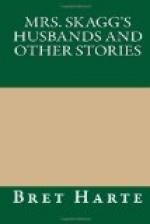Two distinct reports rang through the Hollow. Jack Folinsbee dropped his smoking pistol, took a step forward, and then dropped heavily upon his face.
In a moment the surgeon was at his side. The confusion was heightened by the trampling of hoofs, and the voice of the blacksmith bidding them flee for their lives before the coming storm. A moment more and the ground was cleared, and the surgeon, looking up, beheld only the white face of Culpepper bending over him.
“Can you save him?”
“I cannot say. Hold up his head a moment, while I run to the buggy.”
Culpepper passed his arm tenderly around the neck of the insensible man. Presently the surgeon returned with some stimulants.
“There, that will do, Mr. Starbottle, thank you. Now my advice is to get away from here while you can. I’ll look after Folinsbee. Do you hear?”
Culpepper’s arm was still round the neck of his late foe, but his head had drooped and fallen on the wounded man’s shoulder. The surgeon looked down, and, catching sight of his face, stooped and lifted him gently in his arms. He opened his coat and waistcoat. There was blood upon his shirt, and a bullet-hole in his breast. He had been shot unto death at the first fire.
THE POET OF SIERRA FLAT.
As the enterprising editor of the “Sierra Flat Record” stood at his case setting type for his next week’s paper, he could not help hearing the woodpeckers who were busy on the roof above his head. It occurred to him that possibly the birds had not yet learned to recognize in the rude structure any improvement on nature, and this idea pleased him so much that he incorporated it in the editorial article which he was then doubly composing. For the editor was also printer of the “Record”; and although that remarkable journal was reputed to exert a power felt through all Calaveras and a greater part of Tuolumne County, strict economy was one of the conditions of its beneficent existence.
Thus preoccupied, he was startled by the sudden irruption of a small roll of manuscript, which was thrown through the open door and fell at his feet. He walked quickly to the threshold and looked down the tangled trail which led to the high-road. But there was nothing to suggest the presence of his mysterious contributor. A hare limped slowly away, a green-and-gold lizard paused upon a pine stump, the woodpeckers ceased their work. So complete had been his sylvan seclusion, that he found it difficult to connect any human agency with the act; rather the hare seemed to have an inexpressibly guilty look, the woodpeckers to maintain a significant silence, and the lizard to be conscience-stricken into stone.
An examination of the manuscript, however, corrected this injustice to defenceless nature. It was evidently of human origin,—being verse, and of exceeding bad quality. The editor laid it aside. As he did so he thought he saw a face at the window. Sallying out in some indignation, he penetrated the surrounding thicket in every direction, but his search was as fruitless as before. The poet, if it were he, was gone.




